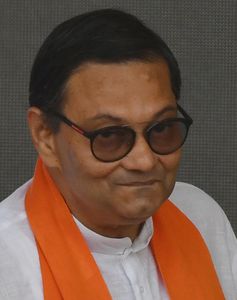How do you look at the tussle between the legacies of Subhas Chandra Bose and Syama Prasad Mookerjee?
No comparison could be drawn between Netaji and Mookerjee. There is no doubt that Mookerjee was a great academician and a Hindu nationalist. But Netaji was a world leader and a secular man.
The Kolkata port has been renamed after Mookerjee.
There was no need. The Kolkata dock was named after Netaji because he went abroad twice from there. I am not perturbed because it has been named after Mookerjee, but I am disturbed that the name of Netaji dock has been changed. This is unacceptable.
The Forward Bloc went to court against it.
That was also not required. I do not think it is a matter for the courts to decide. It is a question of morality and ethics. There are many other things which could be named after Mookerjee. Calcutta has a long road in his name.
How do you describe Mookerjee’s role in history?
I do not want to insult Mookerjee. But it is a fact that he opposed the Quit India movement. The Central government celebrated Mahatma Gandhi’s birthday with so much fanfare, so then how could you mix that with Mookerjee’s politics? Here lies the contradiction. Also, his politics in Bengal was not at all good for Hindu-Muslim unity.
But many people think of him as the creator of West Bengal.
I do not agree. People who should be credited for the partition of Bengal are Jawaharlal Nehru, Muhammad Ali Jinnah and Louis Mountbatten.
But Mookerjee made a massive effort for it.
Then so be it. But if Nehru did not want partition, it would not have happened.
Your family wanted a unified and independent Bengal.
We did. We wanted a secular and independent Bengal. The partition of Bengal was a wrong move.
But look at what happened to West and East Pakistan.
Whatever happened in Pakistan was caused by radical forces there. If Bengal was united, such things would not have happened, at least in East Pakistan. Do not forget that Pakistan was a secular state so long as Jinnah was alive. In India, we faced Sikh radicalism and Hindu radicalism along with Islamic jihadism. What would you say about the people who destroyed Babri Masjid? Are they not radicals?
But how would you define the Muslim League and a man like Huseyn Shaheed Suhrawardy, who should have been indicted for the Calcutta and Noakahali riots?
I agree. My grandfather and granduncle wanted a safe distance from both the Muslim League and the Hindu Mahasabha. They considered them two sides of the same coin.
If that is so, why did Sarat Bose join hands with Suhrawardy?
I do not agree with his decision. But it was an emotional decision. He could not accept the partition of Bengal, which he thought would bring mindless misery to common people. In fact, he was right. But could he have done otherwise? The opposite side was led by Mookerjee, which was equally lethal.
In fact, Netaji had sent my father (Amiya Nath Bose) to Gandhi in 1937 to persuade him to accept a coalition between the Congress and Fazlul Haq’s party. But he could not go as he was suffering from an asthma attack. The Congress did a massive blunder by not accepting that proposal. Had that been accepted, it would have kept the Muslim League in check in Bengal for a decade.
You do not consider Mookerjee a legend?
I do not think of it that way. Of course, Mookerjee made a huge contribution in Kashmir. He was an extremely bright academician and his contribution in Kashmir was extremely memorable and we should cherish that. A man launching such a movement and dying because of that was definitely a big contribution. But that does not mean we should not point out what he got wrong. His Hindu nationalism should not be replicated in Bengal today. In fact, it would be a dangerous idea to propagate such an ideology today. There will be riots in Kolkata if we apply such principles.
Mookerjee did not have a cordial relationship with your grandfather or granduncle.
It does not matter. They do not require any certificate. Mookerjee was a great scholar. He was respected for that. But in Bengal he messed up his own politics. He lacked political acumen. There was no need to create East Pakistan. He could have fought for merging undivided Bengal with India. People would have remembered him forever for that. We think it was a political blunder that time. And, yes, unfortunately the Congress was a part of that blunder.
You said Mookerjee’s ideology was just the opposite of Gandhi’s ideology. But Gandhi also opposed Subhas Bose strongly.
That rivalry was not personal, but was based on some small issues. Rivalry between Mookerjee and the Bose brothers was ideological. Both Netaji and Gandhi were the most secular people India had ever seen. Netaji never compromised with communalism. He rejected the idea of different kitchens for Hindus and Muslims in the Azad Hind Fauj. Gandhi knew all these.
My father told me an interesting story. Gandhi did not take part in the first Independence day celebrations as he did not accept partition. He was in Calcutta and then went to Pune. Sarojini Naidu was with him. My father went to Pune and met with Gandhi. He told Gandhi that had he interfered strongly, partition could have been avoided. Gandhi said everyone wanted to become prime minister and that he could not do much.
When my father was about to leave, Gandhi told him, “Amiya, I think I backed the wrong horse. I should have backed Subhas.”My father broke down hearing that.



